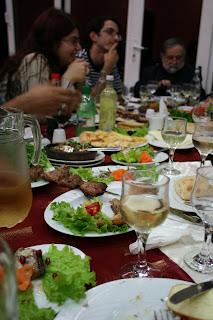IDFA website
THE BIGGEST AND MOST BEAUTIFUL
I reserved a 2-day trip to Amsterdam where the biggest and most significant festival of our trade, the International Documentary Festival Amsterdam (IDFA), has commenced once again. My first IDFA night, however, is spent in an airport hotel in Oslo. It’s far from the relaxed and simultaneously bustling atmosphere of Amsterdam and IDFA.
Helsinki-Vantaa Airport in the grip of a snowstorm
A snowstorm takes over Finland just as our plane is supposed to depart. Delays, cancellations and a plane swap follow as well as a “snow- and ice-clearing operation” on the new plane. Finally, after a 7-hour wait, we manage to take off. There is a stopover in Oslo, and all the connecting flights to Amsterdam have already gone for the night. Therefore, the cold airport hotel, straight out of The Shining, is my accommodation for the first night. The hotel seems “alive” with passengers who have also missed their connecting flights, and there are plenty of them tonight. Many varieties of lonely dweller trample the hotel’s long corridors, and in addition to the single passengers at least a couple of groups of loud Estonian and Russian passengers have also found their way into this land of fjords.
I feel vexed about my cancelled meetings in Amsterdam, but try to utilise the waiting time by doing a big bunch of work assignments that have piled up: letters of reference, offers and contract propositions. The next morning the journey finally takes me to Amsterdam.
The festival's stylish main theatre, Tuschinski
We commenced Shadow of the Holy Book’s festival tour a year ago in this very place. Our world premiere took place in the main hall of the grand Tuschinski cinema. The theatre acts as IDFA's main stage now for the second time running. The premiere week was hectic: screenings, interviews, talk shows and Q&A sessions with the audience. Part of the audience considered our film as a mockumentary, a fake documentary (unbelievable as the story was/is to many viewers) and while we got to speak about the human rights situation in Turkmenistan, we had to keep proving the factual nature of our film. Now after a year has passed, the film has “proven itself” as a documentary and the point of our discussions has fortunately moved onto more relevant issues. An interesting year indeed is behind us.
Kevin with Farid and Ruslan Tuhbatullin at the IDFA 2007 premiere
This time I’m here to meet some colleagues and financiers - to talk about upcoming plans and possible collaborations. Amsterdam is an excellent place for that, because nearly all the people in our industry are here. Representatives of various festivals pop up here and there. Numerous colleagues are looking for funding and fortune in the financial forum, film market and in individual financier meetings. Fortunately there are also the films, their creators, and their audience. Here, all of them have value – in a slightly different way than at Nordisk Panorama. The screenings are bulging with people, and interesting talk show and discussion events have been created around many of the films. Amsterdam really does rock into the rhythm of documentaries at the end of November, and gathers nearly 150,000 viewers into the cinemas each year! Few fiction festivals can beat that.
IDFA takes over Amsterdam at the end of November
IDFA also arouses some envy, as the big and beautiful ones always do. Many think it’s too big, too hectic, too lacking in profile and too commercial, grabbing too many premieres for itself. This is true, at least from some perspectives. However, to a marginal art form, the existence of IDFA creates credibility and self-confidence. It is also an example for everyone and everywhere on how to reach the great masses with content at the forefront. To the industry, IDFA is like an oasis in the desert. It creates sex appeal for documentary film, and that’s something that the industry really needs in order to flourish and get our messages heard. The big audiences need important and moving stories too. That crowd should not be cordoned off from our domain by pushing it forcefully into becoming a victim of "the slush industry".
Many documentary festivals also try to compete with IDFA by fighting over premieres and criticising its profile. Why not, as everything needs to be shaken up and criticised in order to develop and make reforms. This is the case with IDFA too. However, the strength of IDFA is precisely its ability to keep up with the times. Led by the festival director Ally Derks, the team renews and modifies itself commendably with the times and also acts as a pioneer. That is one of the cornerstones of its success. Moreover, Amsterdam is an excellent place for our most important documentary festival. The documentary film crowd is not after palm trees and sunny beaches, but a fascinating, intelligent, artistic, historical, peculiar, and challenging environment. Amsterdam is all of these.
Laurien ten Houten, Director of IDFA Docs For Sale with Adriek van Nieuwenhuyzen, director of IDFA-Industry and one of the festival's founding members
Rush, however, does accumulate in this circus. The advantage of many smaller festivals is that one can take things easy and properly concentrate on encountering just a few people, projects and films. Here people and things rush past your eyes with great speed. The rush takes hold and the oxygen is sometimes about to run out, especially if one wants to achieve as much as possible. One feels like a sultan in his harem. It’s a nice place to visit, but it’s also nice to get out at times. The belly is full, but exhaustion can also strike when trying to eat too much at once.



































